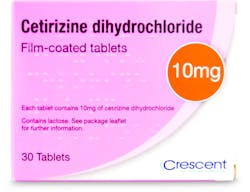Careway Cetirizine Dihydrochloride Allergy & Hay Fever Relief 14 Tablets
Careway Cetirizine Dihydrochloride Allergy & Hay Fever Relief 14 Tablets
All sizes
What 500,000+ customers say about medino:
Description
Careway Allergy & Hay Fever Relief 14 Tablets is a reliable solution for those battling seasonal allergies. These tablets are powered by cetirizine dihydrochloride, a proven antihistamine that blocks histamine's effects, offering respite from symptoms of hay fever and perennial allergic rhinitis. They are appropriate for use by adults and children over six, easing sneezing, itchy and runny noses, and itchy, red, watery eyes. Additionally, individuals suffering from chronic idiopathic urticaria will find relief from the skin's swelling, redness, and itchiness.
Key features
- Formulated with cetirizine dihydrochloride to counteract allergy symptoms
- Effective against hay fever, dust, pet allergies, and urticaria (chronic nettle rash)
- Each tablet provides a 10mg dose for 24-hour symptom relief
- Appropriate for both adults and children aged six and older
- Designed as a non-drowsy formula to prevent sleepiness
- Tablets are easy to swallow and intended for daily consumption
Is Careway Allergy & Hay fever Relief Tablets suitable for children?
No, these tablets are not recommended for children under six years old, as the tablet formulation does not allow the necessary dose adjustments.
What symptoms or conditions can Careway Allergy & Hay Fever Relief 30 Tablets treat?
These tablets are aimed at alleviating symptoms associated with hay fever, perennial allergic rhinitis, and urticaria, like sneezing, runny or blocked nose, and itchy, red, watery eyes.
What are the benefits of taking Careway Allergy & Hay Fever Relief 30 Tablets?
Advantages include efficient relief from allergy symptoms, convenience with once-daily dosing, and a formula that allows users to go about their day unaffected by drowsiness.
How do Careway Allergy & Hay Fever Relief 30 Tablets work?
Cetirizine dihydrochloride, the active ingredient, prevents histamine from causing allergic reactions, thereby reducing symptoms.
Are there any known side effects of Careway Allergy & Hay Fever Relief 30 Tablets?
While side effects like dizziness, drowsiness, dry mouth, sore throat, cough, and nausea can occur, cetirizine is generally well-received.
What are the initial symptoms of hay fever?
The early signs of hay fever encompass frequent sneezing, runny or blocked nose, itchy, red or watery eyes (allergic conjunctivitis), an itchy throat, mouth, nose and ears, and a cough due to postnasal drip.
What causes hay fever to occur?
Hay fever results from the nose and/or eyes coming into contact with environmental allergens such as pollens from grasses, weeds or trees, dust mites, moulds, and animal dander.
In which months is hay fever most prevalent?
Hay fever is typically worse between late March and September when the pollen count is at its highest, particularly during warm, humid, and windy weather.
How long does hay fever usually last?
Hay fever lasts as long as the allergen remains in the air, typically 2-3 weeks per allergen, causing itching of the nose and eyes along with other nasal symptoms.
Can increased water intake alleviate hay fever symptoms?
Drinking sufficient water can help reduce hay fever symptoms, as dehydration leads to increased histamine production, which in turn triggers allergy symptoms.
When is hay fever most severe during the day?
Hay fever symptoms are often worse at night, as pollen descends with the cooling air, with most pollen landing on the ground in rural areas between 8 pm and 10 pm.
Is fatigue a common symptom of hay fever?
Yes, tiredness can be a common symptom for hay fever sufferers, often resulting from a blocked nose or allergy-related headache interfering with sleep.
Ingredients
Active ingredients: Cetirizine hydrochloride.
Excipients: Lactose Monohydrate, Microcrystalline Cellulose, Maize Starch, Colloidal Anhydrous Silica, Magnesium Stearate & Talc.
Film coat contains:
Hypromellose, Lactose monohydrate, Titanium Dioxide, Macrogol 4000 & Sodium Citrate.
Usage and Instructions
Adults and Children aged 12 years and over:
One tablet (10mg), once daily.
Children aged from 6 to 12 years:
Half a tablet (5mg), twice daily.
This medicine isn't recommended for children under 6 years of age.
Can I take Careway Allergy & Hay fever Relief Tablets with alcohol?
It is recommended to avoid taking Allergy & Hay fever Relief Tablets with alcohol, as no data are available on the safety when higher doses of cetirizine and alcohol are taken together.
Warnings
Not suitable for:
- children under 6 years old
Take extra care with this medication:
- be careful if you feel drowsy
- don't drive or operate machinery if you are affected by drowsiness after taking this medication
- this medication can increase the effects of alcohol
Talk to your doctor or pharmacist if you:
- have problems with your kidneys
- have problems passing urine
- are epileptic
- need to have an allergy skin test
- have an enlarged prostate
- are pregnant or breastfeeding
.
Side Effects
All medicines can have some unwanted effects, but they don't effect everyone. Here is what we advise:
Stop taking and see a dr immediately if you experience:
- symptoms of allergic reaction or anaphylaxis such as difficulty breathing, swelling of face or lips, widespread rash or itchiness
- thoughts of suicide. This is very rare, but if you feel this way, stop taking the tablets and tell the dr immediately.
Common side effects (around 1 in 10 people may experience this)
- drowsiness or feeling tired
- headaches
- dry mouth
- headache or dizziness
- stomach pain
- nausea
- runny nose
Rare side effects (around 1 in 1000 people may experience this)
- feeling weak
- agitation
- pins and needles
- skin reactions
.







